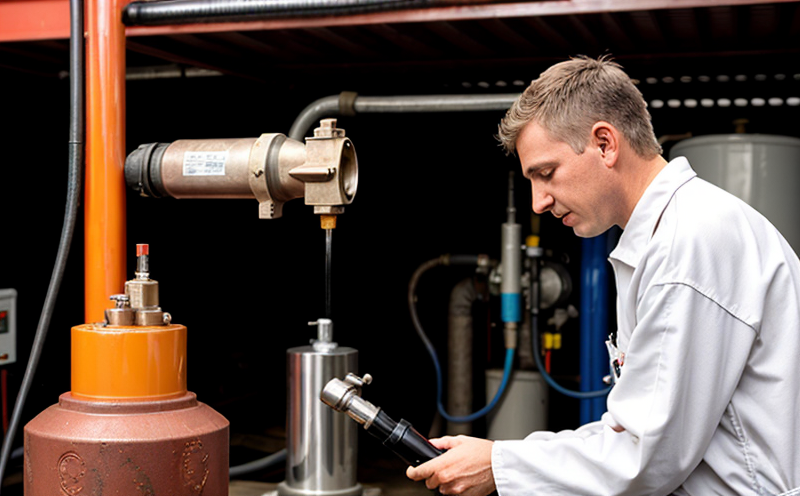ASTM D445 Viscosity Testing of Lubricants and Fuels
The ASTM D445 standard is a critical method used in the aerospace and aviation sectors to measure the viscosity of lubricants and fuels. This test ensures that fluids meet specific performance criteria, which is essential for maintaining engine health and operational safety.
Viscosity is an important property as it affects how easily lubricants flow under different temperatures and pressures. In aerospace applications, where engines operate in extreme conditions, accurate measurement of viscosity becomes crucial to avoid issues such as sludging, wear, or even total failure of the lubricant. This test helps in selecting the right type of fuel or lubricant for a given application ensuring that it will perform reliably under all expected conditions.
The ASTM D445 method uses a Saybolt viscometer to measure kinematic viscosity at 100°F (37.8°C). The results are reported as a Saybolt Furol Seconds reading, which provides an indication of how quickly the lubricant or fuel flows under specified conditions.
Preparation for ASTM D445 testing involves careful selection and handling of the sample. Samples should be representative of the bulk material and stored in appropriate containers to prevent contamination. Prior to testing, samples are often degassed to eliminate air bubbles that could skew results. The testing apparatus must also meet stringent calibration standards to ensure accurate measurements.
During the test, a precise volume of the lubricant or fuel is introduced into the viscometer and allowed to settle before starting the timer. Once the specified time has elapsed, the height of liquid in the viscometer is measured using a calibrated micrometer. This measurement is then used to calculate viscosity according to ASTM D445 specifications.
The results are not only critical for quality assurance but also play a key role in research and development efforts aimed at improving lubricant formulations or fuel blends. By ensuring that these fluids meet the required standards, manufacturers can enhance engine performance while reducing maintenance costs and environmental impact.
ASTM D445 testing is just one of many ASTM tests used in aerospace & aviation quality assurance. It complements other methods like ASTM D396 for determining flash point or ASTM D1879 for measuring pour point, providing a comprehensive approach to ensuring product reliability and safety.
Customer Impact and Satisfaction:
- Enhanced engine performance leading to reduced downtime
- Improved fuel efficiency resulting in cost savings
- Sustained compliance with international aviation regulations
- Increased customer confidence through consistent product quality
International Acceptance and Recognition:
- The ASTM D445 method is widely accepted by global aerospace standards bodies including the International Civil Aviation Organization (ICAO).
- Many leading aviation manufacturers use ASTM D445 results as part of their certification processes.
Quality and Reliability Assurance
Ensuring that lubricants and fuels meet the strictest quality standards is paramount in aerospace & aviation testing. The ASTM D445 viscosity test plays a vital role in this process by providing precise measurements of how fluids behave under specific conditions.
Quality assurance teams rely on accurate ASTM D445 results to verify that lubricants and fuels are suitable for their intended uses. This ensures that aircraft engines, turbines, and other critical components receive the right type of fluid, which is essential for optimal performance and longevity.
The test also helps in identifying any inconsistencies or variations in the product batches, allowing manufacturers to make necessary adjustments before mass production. By adhering to ASTM D445 standards, companies can demonstrate their commitment to maintaining high levels of quality throughout the supply chain.
In addition to meeting regulatory requirements, these tests contribute significantly to the overall reliability and safety of aviation operations. Reliable lubricants and fuels reduce wear on engine parts, minimize risk of failure during critical phases such as takeoff and landing, and extend the life expectancy of aircraft components. This ultimately contributes to safer flights and lower operational costs for airlines.
For R&D engineers, ASTM D445 testing is a valuable tool in developing new formulations that balance viscosity requirements with other desirable properties like oxidation stability or freeze point performance. By using this method early in the development process, they can identify potential issues before investing significant resources into full-scale production.





